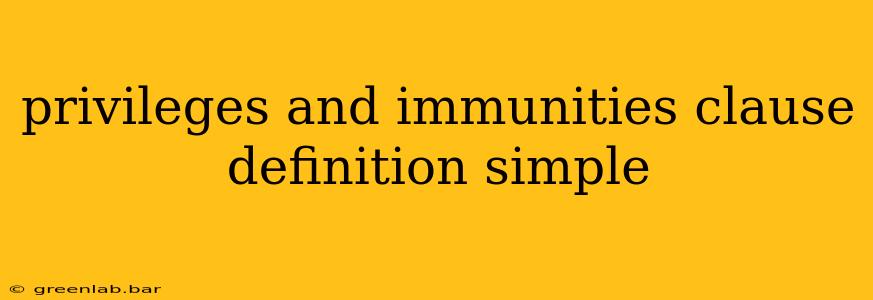The Privileges and Immunities Clause, found in Article IV, Section 2 of the U.S. Constitution, is a crucial part of the foundational framework ensuring fairness and equality among citizens of different states. In simple terms, it prevents states from discriminating against citizens of other states when it comes to fundamental rights and essential activities.
What Does the Clause Actually Say?
The clause states: "The Citizens of each State shall be entitled to all Privileges and Immunities of Citizens in the several States." Sounds straightforward, right? Let's break it down further.
Understanding "Privileges and Immunities"
The term "privileges and immunities" isn't explicitly defined in the Constitution, leading to some legal complexities. However, court rulings have clarified that it generally refers to fundamental rights necessary for participating in the nation's economic and social life. These include:
- Access to Courts: The right to sue and be sued in state courts.
- Property Rights: The right to own, buy, and sell property.
- Right to Travel: The ability to travel freely between states.
- Fundamental Economic Activities: Engaging in business, employment, and other commercial pursuits.
What the Clause Doesn't Protect
It's important to note that the Privileges and Immunities Clause doesn't protect all rights. It doesn't extend to things like:
- Voting Rights: States can restrict voting to their own residents.
- In-State Tuition: States can charge higher tuition to out-of-state students at public universities.
- Licensure Requirements: States can impose stricter licensing requirements for professionals, though these must be demonstrably related to public safety and not discriminatory.
How the Clause Works in Practice
The Clause prohibits states from enacting laws that place unreasonable burdens on citizens from other states compared to their own residents. For example, a state couldn't charge significantly higher taxes on businesses owned by out-of-state residents or deny them access to essential public services. However, a state can treat its own residents differently if there is a substantial justification – for example, preferential treatment for in-state students in public universities is generally considered permissible.
Key Takeaway
The Privileges and Immunities Clause is a cornerstone of national unity, ensuring that citizens are treated fairly regardless of their state of residence. While not absolute, it provides substantial protection against discriminatory state laws targeting citizens from other states, promoting a more equitable and integrated nation. Understanding its nuances is crucial for appreciating the legal and social fabric of the United States.

